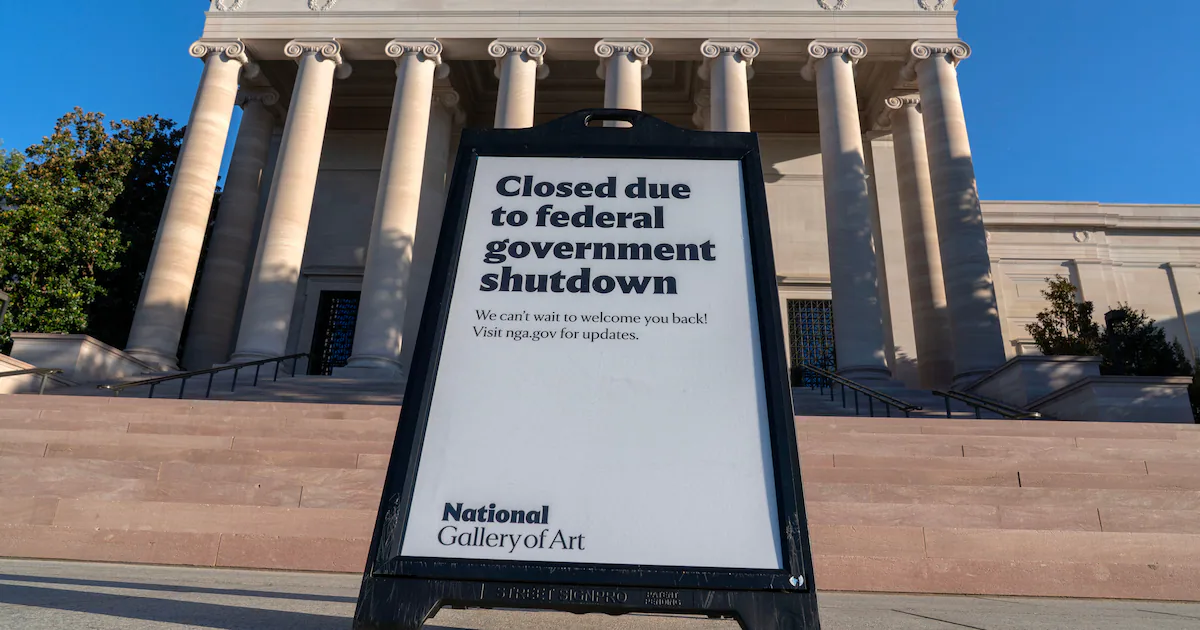Copyright Anchorage Daily News

The Trump administration is creating a two-tier system within the shuttered federal government, paying some staffers required to be on the job even as it leaves many of their colleagues working without salaries. Those still drawing pay include active-duty military personnel, deportation officers and air marshals, as well as 70,000 law enforcement agents spread across the Justice Department and Department of Homeland Security. Where and how the administration is finding money for those salaries - and whether the maneuver is legal - remains unclear, experts said. Employees in roles seen as flashier or gunslinging, like FBI special agents or Immigration and Customs Enforcement deportation officers, are seeing no hit to their bank accounts even as the shutdown drags into a fourth week. But within the same agencies, their colleagues are coming to the office each day without pay until the standoff ends. That includes the behind-the-scenes staff who arrange agents’ travel, maintain their vehicles and process their paychecks, several ICE employees said in interviews. With no indication that the shutdown is likely to end anytime soon, resentment is rising. “We are called support staff, but I’d argue that we drive them,” said one ICE staffer, who is working but not being paid and who spoke on the condition of anonymity for fear of retribution. “Just because they have a gun, badge and authority doesn’t make them more important than us. … It shows that the administration only cares about the gun holders.” White House spokeswoman Abigail Jackson said anyone who’s frustrated by the pay discrepancy should blame Democrats for not voting to end the shutdown. “The Trump Administration wants every federal worker to be paid - that’s why we have repeatedly urged the Democrats to reopen the government and stop hurting the American people,” she said in a statement. “The Trump Administration is working day and night to mitigate the pain Democrats are causing - including by paying the troops and funding food assistance for women and children.” The government has been shut down since Oct. 1, as the two political parties battle over health care policy. Democrats insist that President Donald Trump and the GOP must preserve health insurance subsidies as part of any agreement to fund the government, but Republicans - who control both chambers of Congress - say they won’t negotiate over health care until the government reopens. With Congress deadlocked, and more than 750,000 federal workers placed on unpaid furlough, the administration has acted to preserve government services and pay staffers it prioritizes. Trump officials diverted leftover Pentagon research funding to cover payroll for active-duty troops and directed money from the One Big Beautiful Bill - Trump’s massive tax and immigration package, enacted in July - to members of the Coast Guard, reallocating $10 billion meant to support DHS’s “mission to safeguard the borders of the United States,” according to the text of the statute. Other sources of funding are less clear. Homeland Security Secretary Kristi L. Noem wrote on social media last week that the Secret Service, air marshals and law enforcement officers working for U.S. Customs and Border Protection and ICE would soon receive a “super check.” Slated to arrive Wednesday, the payment will include “4 days lost, their overtime, and their next pay period,” she wrote - without specifying the funding source. FBI Director Kash Patel similarly said last week that the president had “found a way” to compensate FBI special agents during the shutdown. He did not elaborate. “We got the people that we want paid, paid,” Trump said a week ago, speaking in the Oval Office. The president and White House budget office have broad latitude during shutdowns to determine which employees are crucial to national security and protecting government property, who must remain on the job even as funds to pay them lapse. Other civilians are furloughed. Congress in 2019 passed legislation, signed by Trump, ensuring employees receive back pay after a shutdown, including workers who weren’t called in during the closure. The Trump administration has floated not paying furloughed employees, probably in violation of that statute. Trump has claimed sweeping authority to move money around to keep other employees compensated. The president last week said his authority as commander in chief gave him the ability to redirect untold sums within the Defense Department to make payroll for active-duty personnel, though his control of the military is irrelevant to Congress’s constitutional authority over spending. In talking points circulated to lawmakers, the White House budget office’s top lawyer wrote that a “conjunction of the crises” domestically and internationally compel the president to repurpose Pentagon funds without congressional approval to pay service members. Mark Paoletta, the general counsel for the Office of Management and Budget, cited a dozen examples of when presidents reallocated or disbursed money before Congress approved it - but most were from the 18th and 19th centuries, and there have been none since Congress passed laws in 1974 and 1982 that further constrained the president’s spending power. “Congress’s failure to fund our military personnel is unacceptable,” Paoletta wrote. “In such a dire circumstance as this, where there is no other appropriation providing for payment of military salaries, and where failure to pay our troops directly undercuts the effectiveness of other appropriations … the president may, as commander in chief, direct that such appropriations be used to cover military salaries.” Strict laws guide how and when the executive branch can reroute congressionally provided funding, and the administration is probably breaking several of them, experts said. At the very least, the White House’s moves to spread funds around will test lawmakers’ will to rein in the executive branch. Still, it is hard to know for sure until it becomes clear exactly where the administration is sourcing all of its shutdown salaries, said Kevin Owen, a federal employment lawyer. “The best I can say is this isn’t normal,” Owen said. “It’s fundamentally unfair, and it is going to fracture and factorize the civil service.” The Senate plans to vote Wednesday or Thursday on a Republican-led bill that would pay federal workers who have to continue working during a shutdown. “We’re forcing people to work, and they don’t have any expectation of getting a paycheck anytime soon. It’s just fairness,” said Sen. Ron Johnson (R-Wisconsin), who is sponsoring the measure. “It doesn’t cost the government any more. We already have a bill that’s going to give them back pay. So pay them up front.” Democrats are expected to reject the measure, arguing the Republican bill gives the president leeway to decide which workers to pay. Sens. Chris Van Hollen (D-Maryland) and Gary Peters (D-Michigan) are proposing an alternative they say would fix that, but it is also expected to fail. Some of the most visible employees going without pay include those responsible for ensuring Americans can fly safely. The roughly 47,000 Transportation Security Administration employees responsible for screening travelers at more than 400 airports nationwide will not be paid, according to TSA officers and a government official speaking on the condition of anonymity because they were not authorized to discuss the issue publicly. The decision has left some transportation security officers puzzled and frustrated. “It’s one government, but now you’re separating us out by jobs,” said one officer, who spoke on the condition of anonymity for fear of retaliation. “That’s a decision made way above me, but let’s make some kind of deal so that all the workers can get paid.” TSA did not respond to questions about the decision. Air traffic controllers are also working without pay. But federal contractors who train new controllers at the agency’s academy in Oklahoma City are receiving paychecks, as are student trainees. Students who graduate from the academy and begin on-the-job training at a FAA facility are not being paid, though. During the last - and longest - government shutdown, which began in 2018 and stretched into 2019, the FAA’s academy was shuttered for more than a month. The closure exacerbated a long-standing shortage of controllers, putting the agency further behind in its effort to address staffing gaps. This time around, the agency has kept the academy open. “Our work to recruit, hire and train air traffic controllers continues,” the agency said in a statement. “Students are in class, they are advancing to training in facilities and we are onboarding successful candidates.” It was not clear what funds were being used to continue operations at the academy. The Transportation Department’s shutdown plan indicated only that the “FAA has sufficient liquidating cash to continue operations during a lapse in appropriations.” Elsewhere across government, people working without pay are mostly in less glamorous desk jobs, which federal employees said the Trump administration is mistakenly treating as less important. At the FBI, for example, special agents are getting paid, but translators, some attorneys and support staffers are not. The FBI Agents Association wrote in a statement that this is a shortsighted strategy. “The FBI’s success … depends on more than its Agents,” the association wrote. “Analysts, professional staff, and other personnel - who continue to work without pay - play a vital role in confronting threats from terrorism and cyberattacks to violent crime and corruption.” Similarly, within the Justice Department’s Bureau of Alcohol, Tobacco, Firearms and Explosives, law enforcement agents are paid while workers in support roles are not, according to two federal officials familiar with the matter. The Justice Department referred questions about the arrangement to OMB. One ATF employee said the disparity feels especially unfair because law enforcement officers typically use government cars, with gasoline paid for through federal fleet cards. Most of their unpaid colleagues, however, drive to work in their own cars, on their own dime. Homeland Security staff said they were not surprised that pay was continuing for special agents, criminal investigators and ICE deportation officers. Immigration enforcement has been a major priority for the administration since Jan. 20, the employees noted, and many federal workers have felt as if ICE is getting the resources, staff and money that are disappearing from other parts of government. But Trump is not paying the people who make much of his deportation drive possible, one ICE employee warned, speaking on the condition of anonymity for fear of retribution. That includes intelligence analysts, seized property specialists, computer forensic analysts, asset forfeiture specialists, cyber operations officers, forensic interview specialists and victim assistance program staff. Some unpaid workers are processing their paid colleagues’ time sheets and paychecks, the ICE employee said. “It’s definitely ruining morale and making people jaded,” the employee said. “I know it’s not the agents’ fault, and they aren’t rubbing it in at all, but they shouldn’t be expecting us to not feel some type of way about this. I can’t pay my mortgage, but I’m expected to continue performing at the same level.” - - -



